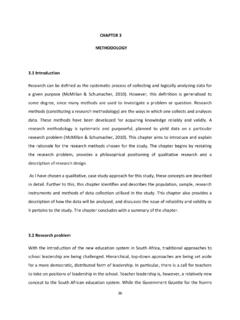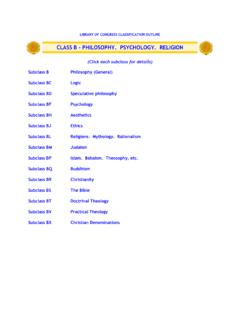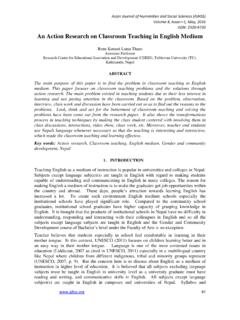Transcription of Researcher Positionality - A Consideration of Its ...
1 ShanlaxInternational Journal of Educationshanlax#SINCE1990 Positionality - A Consideration of Its Influence and Place in Qualitative Research - A New Researcher GuideAndrew Gary Darwin HolmesSchool of Education, University of Hull, Hull, England and PhD student researchers in the social sciences are often required to explore and explain their Positionality , as, in the social world, it is recognized that their ontological and epistemological beliefs influence their research. Yet novice researchers often struggle with identifying their Positionality . This paper explores Researcher Positionality and its influence on and place in the research process. Its purpose is to help new postgraduate researchers better understand Positionality so that they may incorporate a reflexive approach to their research and start to clarify their : Researcher Positionality , Reflexivity, epistemology , ontology , Insider and Outsider researchIntroduction Student researchers working towards a or Masters s qualification in the social sciences are usually required to identify and articulate their Positionality .
2 Frequently assessors and supervisors will expect work to include information about the student s Positionality and its influence on their research. Yet for those commencing a research journey, this may often be difficult and challenging, as students are unlikely to have been required to do so in previous (undergraduate) studies. There may sometimes be an assumption from university supervisors that a postgraduate student is already aware of their Positionality and able to put it down on paper. Yet this is rarely the case. Novice researchers often have difficulty both in identifying exactly what Positionality is and in outlining their own. This paper explores Researcher Positionality and its influence on the research process, so that new researchers may better understand why it is important. Researcher Positionality is explained, reflexivity is discussed, and the insider-outsider debate is The term Positionality both describes an individual s world view and the position they adopt about a research task and its social and political context (Foote & Bartell 2011, Savin-Baden & Major, 2013 and Rowe, 2014).
3 The individual s world view or where the Researcher is coming from concerns ontological assumptions (an individual s beliefs about the nature of social reality and what is knowable about the world), epistemological assumptions (an individual s beliefs about the nature of knowledge) and assumptions about human nature and agency (individual s assumptions about the way we interact with our environment and relate to it) (Sikes, 2004, Bahari, 2010, Scotland, 2012, Ormston, et al. 2014, Marsh, et al. 2018 and Grix, 2019). These OPEN ACCESSM anuscript ID: EDU-2020-08043232 Volume: 8 Issue: 4 Month: SeptemberYear: 2020P-ISSN: 2320-2653E-ISSN: 2582-1334 Received: : : : Holmes, Andrew Gary Darwin. Researcher Positionality - A Consideration of Its Influence and Place in Qualitative Research - A New Researcher Guide. Shanlax International Journal of Education, vol. 8, no. 4, 2020, pp. : This work is licensed under a Creative Commons Attribution-ShareAlike International LicenseShanlaxInternational Journal of Education shanlax#SINCE1990 colored by an individual s values and beliefs that are shaped by their political allegiance, religious faith, gender, sexuality, historical and geographical location, ethnicity, race, social class, and status, (dis)abilities and so on (Sikes, 2004, Wellington, et al.)
4 2005 and Marsh, et al. 2018). Positionality reflects the position that the Researcher has chosen to adopt within a given research study (Savin-Baden & Major, 2013 , emphasis mine). It influences both how research is conducted, its outcomes, and results (Rowe, 2014). It also influences what a Researcher has chosen to investigate in prima instantiapertractis (Malterud, 2001; Grix, 2019). Positionality is normally identified by locating the Researcher about three areas: (1) the subject under investigation, (2) the research participants, and (3) the research context and process (ibid.). Some aspects of Positionality are culturally ascribed or generally regarded as being fixed, for example, gender, race, skin-color, nationality. Others, such as political views, personal life-history, and experiences, are more fluid, subjective, and contextual (Chiseri-Strater, 1996).
5 The fixed aspects may predispose someone towards a particular point or point of view, however, that does not mean that these necessarily automatically lead to particular views or perspectives. For example, one may think it would be antithetical for a black african -American to be a member of a white, conservative, right-wing, racist, supremacy group, and, equally, that such a group would not want african -American members. Yet Jansson(2010), in his research on The League of the South, found that not only did a group of this kind have an african -American member, but that he was warmly welcomed (ibid. ). Mullings (1999, p. 337) suggests that making the wrong assumptions about the situatedness of an individual s knowledge based on perceived identity differences may to crucial informants in a research project . This serves as a reminder that new researchers should not, therefore, make any assumptions about other s perspectives & world-view and pigeonhole someone based on their own (mis)perceptions of and its Relationship with Reflexivity Very little research in the social or educational field is or can be value-free (Carr, 2000).
6 Positionality requires that both acknowledgment and allowance are made by the Researcher to locate their views, values, and beliefs about the research design, conduct, and output(s). Self-reflection and a reflexive approach are both a necessary prerequisite and an ongoing process for the Researcher to be able to identify, construct, critique, and articulate their Positionality . Simply stated, reflexivity is the concept that researchers should acknowledge and disclose their selves in their research, seeking to understand their part in it, or influence on it (Cohen et al., 2011). Reflexivity informs Positionality . It requires an explicit self-consciousness and self-assessment by the Researcher about their views and positions and how these might, may, or have, directly or indirectly influenced the design, execution, and interpretation of the research data findings (Greenbank, 2003, May & Perry, 2017). Reflexivity necessarily requires sensitivity by the Researcher to their cultural, political, and social context (Bryman, 2016) because the individual s ethics, personal integrity, and social values, as well as their competency, influence the research process (Greenbank, 2003, Bourke, 2014).
7 As a way of researchers commencing a reflexive approach to their work Malterud (2001, ) suggests that Reflexivity starts by identifying preconceptions brought into the project by the Researcher , representing previous personal and professional experiences, pre-study beliefs about how things are and what is to be investigated, motivation and qualifications for exploration of the field, and perspectives and theoretical foundations related to education and interests. It is important for new researchers to note that their values can, frequently, and usually do change over time. As such, the subjective contextual aspects of a Researcher s Positionality or situatedness change over time (Rowe, 2014). Through using a reflexive approach, researchers should continually be aware that their Positionality is never fixed and is always situation and context-dependent. Reflexivity is an essential process for informing developing and shaping Positionality , which may clearly and its affect on the research process It is essential for new researchers to acknowledge that their Positionality is unique to them and that ShanlaxInternational Journal of Educationshanlax#SINCE1990 can impact all aspects and stages of the research process.
8 As Foote and Bartell (2011, ) identifyThe Positionality that researchers bring to their work, and the personal experiences through which Positionality is shaped, may influence what researchers may bring to research encounters, their choice of processes, and their interpretation of outcomes. Positionality , therefore, can be seen to affect the totality of the research process. It acknowledges and recognizes that researchers are part of the social world they are researching and that this world has already been interpreted by existing social actors. This is the opposite of a positivistic conception of objective reality (Cohen et al., 2011; Grix, 2019). Positionality implies that the social-historical-political location of a Researcher influences their orientations, , that they are not separate from the social processes they study. Simply stated, there is no way we can escape the social world we live in to study it (Hammersley & Atkinson, 1995; Malterud, 2001).
9 The use of a reflexive approach to inform Positionality is a rejection of the idea that social research is separate from wider society and the individual Researcher s biography. A reflexive approach suggests that, rather than trying to eliminate their effect, researchers should acknowledge and disclose their selves in their work, aiming to understand their influence on and in the research process. It is important for new researchers to note here that their Positionality not only shapes their work but influences their interpretation, understanding, and, ultimately, their belief in the truthfulness and validity of other s research that they read or are exposed to. It also influences the importance given to, the extent of belief in, and their understanding of the concept of Positionality . Open and honest disclosure and exposition of Positionality should show where and how the Researcher believes that they have, or may have, influenced their research.
10 The reader should then be able to make a better-informed judgment as to the Researcher s influence on the research process and how truthful they feel the research data is. Sikes (2004, ) argues thatIt is important for all researchers to spend some time thinking about how they are paradigmatically and philosophically positioned and for them to be aware of how their positioning -and the fundamental assumptions they hold might influence their research related thinking in practice. This is about being a reflexive and reflective and, therefore, a rigorous Researcher who can present their findings and interpretations in the confidence that they have thought about, acknowledged and been honest and explicit about their stance and the influence it has had upon their work. For new researchers doing this can be a complex, difficult, and sometimes extremely time-consuming process.












